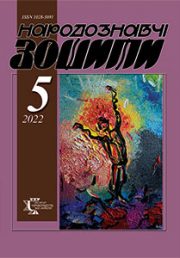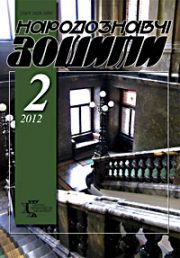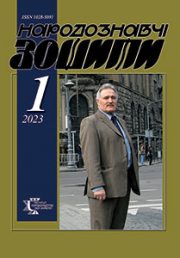The Ethnology Notebooks. 2022. № 4 (166), 995—1000
UDK 398(=161.2)(091)”19″О.Роздольський
DOI https://doi.org/10.15407/nz2022.04.995
OSYP ROZDOLSKYI IN THE HISTORY OF UKRAINIAN FOLKLORE STUDIES (to 150th birth anniversary)
SOKIL Hanna
- ORCID ID: https://orcid.org/0000-0002-8352-2124
- Doctor of Philological Sciences, professor,
- Ivan Franko National University of Lviv,
- 1, Universytetska Street, 79000, Lviv, Ukraine,
- Contacts: e-mail: gan.sokil@gmail.com
Abstract. The main stages of Ukrainian researcher activity in folklore studies and his investment into this academic area are covered in this article. The relevance of the topic is determined by the 150th researcher’s anniversary that takes place in 2022. The aim of the article is to generalize the academic activity of Ukrainian folklorist, reveal the main direction of his studies, to show the role and investment in science.
The object of the article is the personality of Osyp Rozdolskyi and the subject is his academic activity in the area of folklore studies during the first half of XX century aimed at the development of ethnology. Osyp Rozdolvkyi’s academic activity is closely connected with Shevchenko Scientific Society. Therefore the research focuses on the editions of Ethnographic commission such as Ethnographic collection and Materials to Ukrainian ethnology, where the notes in scholar’s collections are published as well as on his archived materials. The main principles of academic activity that were developed by the representatives of Shevchenko Scientific Society, their implementation in contemporary science and perception by our contemporaries were included in methodological basis of the research.
The novelty is in new approaches to studying the scholar biography of the folklorist, analysis of new perspectives, values in scholar’s academic activity and his role in the area of ethnology that have appeared during the years of independence.
The following methods of research have been applied: textological, biographical, generalization, chronological, comparative historical.
The geography of O. Rozdolskyi’s studies includes Opillya, Boykivshchyna, Bukovyna, Dnieper Ukraine, Lemko region. His collections of folk prose such as Galician folk fairytales, Galician folk novels played significant role. The notes of folk songs with music were included into 2 volumes edition Galicia-Rus folk melodies (edited by S. Liudkevich) and into collection Hayilky in V. Hnatiuk’s arrangement. Significant understanding of predecessors achievements at the modern stage will extend the objective research of national culture and science.
Keywords: folklore, collections, principles of classification, genre’s system, modern understanding.
Received 29.08.2022
REFERENSES
- Sokil, H. (2000). Osyp Rozdolskyi. Life and activity. Lviv [in Ukrainian].
- Dovhalyuk, I. (2000). Osyp Rozdolskyi. Musical and ethnographic work. Lviv [in Ukrainian].
- Sokil, H. (1995). From the unpublished correspondence of O. Rozdolskyi. Ethnological notebooks, 4, 235—240; 5, 308—313 [in Ukrainian].
- Sokil, G. (2011). Ukrainian folkloristics in Galicia at the end of the 19th — the first third of the 20th century: historical and theoretical discourse. Lviv [in Ukrainian].
- Day, O.I. (1970). Prospectus of the fifty-volume edition of Ukrainian folklore. Folk creativity and ethnography, 4, 49—55 [in Ukrainian].
- Rozdolskyi, O. (Ed.).(2002). Tales and legends of Brodivshchyna. Lviv [in Ukrainian].







